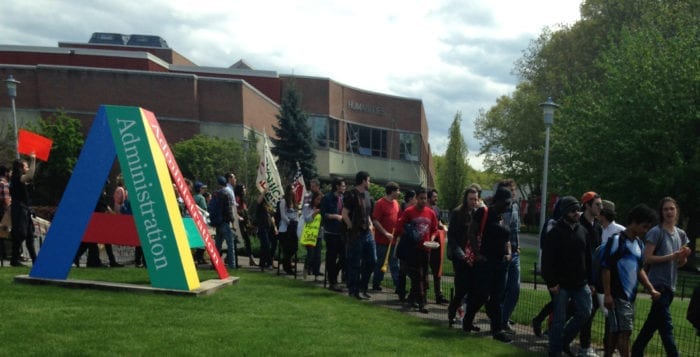Despite protests from students and faculty members, which included a March for Humanities rally May 10, the administration of Stony Brook University has decided to move ahead with the consolidation of departments in the College of Arts and Sciences.
In a June 22 email from Sacha Kopp, dean of the College of Arts and Sciences, the announcement was made the school will create a new Department of Comparative World Literature by combining the current departments of European Languages; Literatures & Cultures; Cultural Studies & Comparative Literature and Hispanic Languages & Literature.
“This newly combined department will draw upon faculty strengths in literature, culture and language across the college and reinforce Stony Brook’s position as a global institution,” he said in the email.
Kopp said undergraduate majors and minors in Spanish, French, Italian and German as well as a minor in Russian and master’s degree programs in language teaching would all be contained within the new department. The university will also continue to offer the graduate degree program in Hispanic languages and literature.
Other changes include the suspension of admissions into the undergraduate degree programs in theatre arts; comparative literature; cinema and cultural studies and into the graduate degree programs in cultural studies and comparative literature.
“While suspending admissions into programs is an extremely difficult decision, it is important to recognize that if constrained resources were spread over a growing number of programs, all of our programs would be weakened,” Kopp said. “That said we are building resources in key departments that have demonstrated academic and scholarly excellence.”
Port Jefferson resident Naomi Solo, whose husband Richard was part of the university faculty for five decades, said she was disappointed in the news, especially when it came to the suspension of admissions to the theatre arts program as she remembers the political theater of the 1960s and 70s.
“[The theatre arts program] is something that’s not a big money maker but makes a fuller university,” Solo said.
Kopp said that the university has planned no course changes for the 2017-18 academic year and students enrolled as of May 1 in the upcoming suspended programs will be able to complete their studies.
“For the fewer than 100 students who are currently enrolled in the degree programs into which new admissions are being suspended, every one of these students will have the opportunity to complete their programs, and we will honor existing commitments to graduate students for teaching assistantships,” he said.
According to a Frequently Asked Questions section created by the university on their website regarding the changes, the institution is making every effort to limit the impact to faculty and staff. The university is planning to reassign most; however, “some term appointments may not be renewed.” Administrators are also exploring other elements as part of a process to address the university’s “overarching budgetary challenges. According to the FAQ, “when put into practice we anticipate savings in excess of $1 million.”
Kopp said the changes occurred after discussions with faculty leadership, members of the university administration, the provost, the graduate school and the university senate.
Jordan Helin, a Ph.D. candidate in history and a department mobilizer in the history department for the Graduate Student Employees Union, participated in the May rally that the GSEU organized. Helin in an email said he wasn’t surprised by the announcement, and he sees no reason for the GSEU to give up on opposing the plan.
“A decision made is a decision that can be unmade,” he said. “Up until now, the administration has gotten by on waving off criticism because they are just floating ideas and nothing has been decided. Now that they have decided, they can be attacked with more specificity.”
Caroline Parker, who just completed her sophomore year and participated in the May rally, said in an email the combining of departments “flies in the face of the ‘commitment to diversity’ Stony Brook likes to uphold.”
“It’s true that these programs are small in numbers, but the critical thinking skills, cross-cultural exploration, creative expression and research taught therein are immeasurable for their far-reaching implications beyond borders and disciplines,” she said.
Parker said she is concerned about the future of the college.
“A true university cannot exist without humanities,” she said. “While people will be able to finish their degrees in the suspended programs, I fear the loss is a slippery slope and shows Stony Brook has lost sight of its mission, which will certainly affect future prospective students and the richness of our campus now.”





